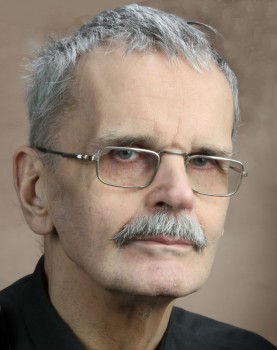Between life and death
23 September 2011 | Authors, Reviews

Gösta Ågren. Photo: Studio Paschinsky
The latest poems by Gösta Ågren, in the collection I det stora hela (‘On the whole’, Söderströms, 2011), are a continuation of the poet’s lifelong striving to unite the realm of private and personal experience with the domain of the shared, the social and the universal.
Ågren, born in 1936 in Ostrobothnia, on the west coast of Finland, has published twenty-eight collections of poetry. I det stora hela is the latest in an apparently inexhaustible series of books that reflect upon life and death, mostly in terse, aphoristic blocks that are hewn out of the poet’s own existence.
In the background of nearly all his poems is an Ostrobothnian childhood which, in its remoteness and solidarity with his close relatives, sets him apart in the same way as the Swedish language in which he writes sets him apart within a Finnish cultural context, though perhaps not in a Finland-Swedish one – for he shares not only its linguistic heritage, but also its traditional concern with the polarity and ultimate reconciliation of the individual and the community.
To achieve the synthesis that is the hallmark of his poetry, Ågren makes reference to the universalising quality of classical Greek drama, and especially to its anonymous chorus – the symbol and realisation of mankind in general. In these concise and often painfully intricate epiphanies we are confronted with an extension of the meaning expressed by the German classic poet Friedrich Hölderlin in his four-line poem Die Linien des Lebens (The lines of life): Was hier wir sind, kann dort ein Gott ergänzen (‘What here we are, there a God can complete’).
The joys, sorrows, failures and celebrations of individual lives are the token of cosmic events that take place elsewhere, on the other side of the gulf that separates the living from the dead. It is a process that we are sometimes dimly aware of in the processes of nature: in the eyes of a cow that is being approached by two people, the poet sees an affirmation of being that is primordial, and goes beyond the immediately human: She observes them / as she observes everything / that moves in the night’s white / peace, for nothing is quite / guiltless; everything that is, / is ancient, and seeks. (Kons ögon, ‘The cow’s eyes’)
Tags: poetry
No comments for this entry yet
Leave a comment
Also by David McDuff
Finlands svenska litteratur 1900–2012 [Finland’s Swedish literature 1900–2012] - 6 November 2014
Facing catastrophe - 31 December 1995
Eye of the storm - 31 December 1993
Out of Ostrobothnia - 31 December 1992
-
About the writer
David McDuff is a translator and writer living in Kent, England. Among his translations are works written in Swedish, Russian, Icelandic, Norwegian, Danish and Finnish. His English version of the complete poems of the Finland-Swedish classic poet Edith Södergan (died 1923) appeared in England in 1984; his selected poems by Gösta Ågren were published in 1992, under the title A Valley in the Midst of Violence. In 2013 McDuff was awarded the Finnish State Prize for the Translation of Finnish Literature.
© Writers and translators. Anyone wishing to make use of material published on this website should apply to the Editors.
